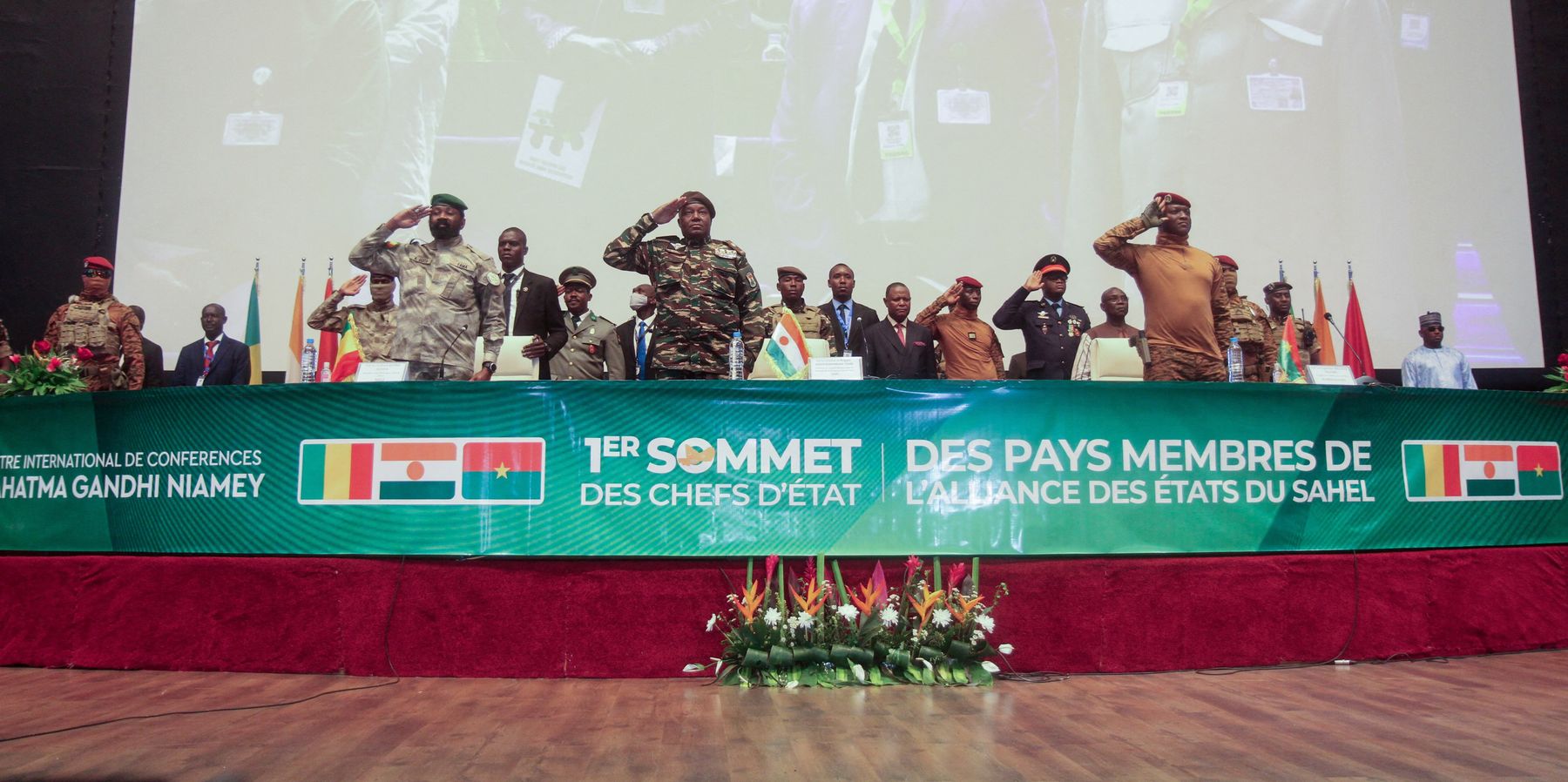On July 6, the three junta-led countries of the western Sahel — Mali, Niger, and Burkina Faso — signed a treaty to establish a security alliance between them. This announcement came during the first summit of the Alliance of Sahel States (AES), a trilateral body formed by the three governments in September 2023, encompassing a total population of 72 million people.
This is in accordance with the announcement the three governments made in March that they would jointly create a task force with the goal of better integrating security operations in response to possible threats.
The military rulers created AES to formalize their alliance in a new intergovernmental body that they intend to serve as an alternative to the Economic Organization of West African States (ECOWAS), the much larger regional group focused on advancing economic integration and facilitating diplomacy among its member states.
The July 6 treaty forms a deeply interconnected confederation between the three countries that looks to facilitate dialogue on matters related to security as well as deepen their economic ties.
In a clear indication of his perspective on the role foreign governments and multilateral bodies have played in Nigerien affairs, Niger’s military leader, Abdourahamane Tiani, said in an interview during the trilateral summit that “our people have irrevocably turned their backs on ECOWAS. … It is up to us today to make the AES Confederation an alternative to any artificial regional group by building ... a community free from the control of foreign powers."
The three governments have a history of calling out foreign countries, particularly France, and external bodies for interfering in their domestic affairs and imposing strict conditions on their governance in return for good relations and aid. Part of this anger has been directed towards ECOWAS, which has sanctioned member countries that fail to maintain democratic governance.
Following last year’s coup in Niger, ECOWAS threatened to intervene with military force if democratic rule was not restored. The Nigerien junta called ECOWAS’s bluff, and the regional body ultimately backed down.
The three military-ruled governments jointly announced their withdrawal from ECOWAS in January 2024, bringing to the forefront questions about ECOWAS’s future and its ability to resolve regional disputes. In an unsuccessful attempt to dissuade the governments from leaving, ECOWAS announced in February that it would lift sanctions on Niger that had been imposed after the coup.
But beyond dissatisfaction with ECOWAS, the three juntas have also expressed frustration with foreign powers. On Monday, July 8, the United States announced that it had completed its withdrawal of 1,000 American troops that were stationed at a military base near Niger’s capital, Niamey, and that it will continue to remove its personnel from a second military installation in the country. This comes in response to the ruling Nigerien junta ordering the United States to end its military presence in the country. From the junta’s perspective, the United States had failed to reduce insecurity and has been unable to improve the economic health of Nigeriens . Despite millions spent on the country — the United States spent $223 million in aid to Niger in 2023 alone — insurgent groups remain present in Niger while the economic health of the country remains dire.
Prior to last summer’s coup, Washington had worked with the civilian-led Nigerien government on security issues, including sharing security intelligence, conducting military training programs, and building and using multiple military bases in the country. Since seizing power, however, the junta has severed the once-strong alliance with the United States, expressing dissatisfaction with the way American officials have reportedly lectured them on the importance of democracy — something clearly not of interest to a ruling junta that acquired power through a coup. The United States has also argued that the geopolitical risks of forming new security partnerships with Russia pose a danger to human rights, another issue that likely fails to resonate with a military government whose top priority is maintaining power, rather than helping the United States compete against Russia or promote the U.S.-invented rules-based order.
Ultimately, the creation of this new alliance and the recent news of the creation of a confederacy is yet a further sign of how far these three countries have drifted from the West.
Gone are the days when the United States and France maintained close ties with these countries on the grounds that they were working to advance mutual security interests in a regional fight against terrorism. Now, they’re openly antagonistic to Western powers while gladly working with Russian forces whose security support helps them meet their self-interest.
- What Washington got wrong about Niger and Russia ›
- Niger's accusation of Western chicanery hits close to home | Responsible Statecraft ›
- Trump returns to a failed playbook in Africa | Responsible Statecraft ›
















